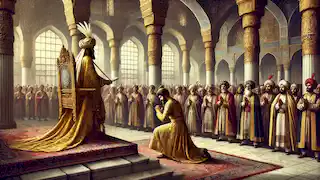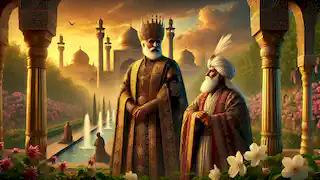Once upon a time, in the heart of ancient Persia, there was a great shah who ruled his kingdom with wisdom and fairness. His empire stretched from the mountains in the east to the fertile valleys in the west. Every morning, the shah would sit in his grand palace overlooking the vast city below, marveling at the beauty of his land and the peace that reigned throughout his kingdom.
However, this peace did not come easily. For many years, the shah had struggled to bring harmony to his empire. He had fought countless battles, defended his people against invaders, and made tough decisions that often weighed heavily on his heart. Throughout these turbulent times, one man had stood by his side—a man of immense knowledge and strategic brilliance—the shah's vizier.
The vizier was not only the shah’s closest advisor but also his dearest friend. He had served the court for decades, guiding the shah through the labyrinthine politics of the empire, helping him make decisions that would shape the destiny of his people. His wisdom was renowned throughout the kingdom, and many believed that without the vizier, the shah would never have achieved such prosperity and stability.
But time had passed, and the vizier had grown old. His once sharp features had softened, and his beard, once black as night, was now streaked with silver. The shah noticed this, but more importantly, he noticed that the vizier’s advice had become more cautious, more hesitant. And in a time of rising threats from neighboring empires and unrest within the borders, the shah began to question whether the vizier was still the right man for the job.
One evening, after a long day of deliberation in the royal court, the shah retired to his private chambers. He sat by the window, staring out into the night sky, his thoughts heavy with uncertainty. Could it be that his trusted vizier had lost his touch? Was it time to find a new advisor, someone younger and more in tune with the challenges of the present?
The shah knew he could not make such a decision lightly. The bond he shared with the vizier was built on years of loyalty, and to dismiss him would not only be a political move but a personal betrayal. Yet, as the ruler of Persia, the shah had to put the needs of the kingdom above all else.
The next day, the shah summoned the vizier to his private gardens. The air was thick with the fragrance of blooming jasmine, and the sound of running water from the fountains filled the air.
“Old friend,” the shah began, “we have walked many paths together, faced many trials. But I must ask you—do you still feel the fire of wisdom burning within you? The decisions we must make now are fraught with danger, and I fear that time has dulled your sharpness.”
The vizier, with his ever-calm demeanor, smiled and bowed his head slightly. “My shah, I have served you for many years, and in that time, I have seen the empire grow and prosper. But I understand your concerns. Time, indeed, spares no man. However, wisdom does not fade with age; it deepens. Yet, if you believe that a younger mind would better serve the kingdom, I will accept your judgment with grace.”
The shah was moved by the vizier’s humility, but his doubts remained. He decided to test the vizier, to see if he still had the insight and acumen that had served him so well in the past. The shah devised three challenges—each more difficult than the last—and if the vizier succeeded in these trials, it would prove that his wisdom was still as keen as ever.
The next morning, the shah called for the vizier and informed him of the challenges. The first trial would test the vizier’s ability to solve a complex riddle, the second would require him to navigate a delicate diplomatic situation, and the third would be a test of loyalty—a test that would challenge the vizier’s integrity.
The vizier listened carefully, his expression unreadable. He bowed to the shah and accepted the trials with quiet confidence. The shah’s first challenge was a riddle, one that had confounded scholars for centuries. In the palace archives was an ancient manuscript that spoke of a hidden treasure buried deep within the desert sands. The treasure was said to be so vast that it could fund an entire army for years, and many had sought it, but none had succeeded in finding it. The riddle went as follows: “In the land where no trees grow, where the sun beats upon the earth and the moon whispers secrets to the stars, there lies a stone. Beneath this stone is the key, but the stone itself is guarded by the shadow of a forgotten king. Find the shadow, and the treasure shall be yours.” The vizier spent hours in deep thought, analyzing every word of the riddle. He understood that the desert was the obvious location, but which desert? Persia was surrounded by many vast and arid regions, and the riddle was deliberately vague. Then, after much contemplation, the vizier realized that the "shadow of a forgotten king" was not a literal shadow, but a metaphor. He remembered a long-forgotten monument in the desert that was erected for a king whose name had been erased from history due to his tyranny. The monument was a towering stone structure that cast a shadow over the land—a shadow that could only be seen at a certain time of day. With this insight, the vizier set off into the desert with a small group of men. They traveled for days, braving the harsh heat and biting winds, until they reached the ancient monument. As the sun began to set, the vizier saw the shadow of the monument stretch across the sands. He followed the shadow to its end, where a single stone lay half-buried in the sand. “Here it is,” the vizier declared, and with the help of his men, they lifted the stone to reveal a small key hidden beneath it. The first challenge was complete. For the second challenge, the shah presented the vizier with a delicate diplomatic crisis. A neighboring kingdom, with whom Persia had maintained a fragile peace, had sent a letter to the shah, accusing Persia of violating their border agreements. The letter was aggressive, threatening war if the alleged violations continued. The shah had already sent diplomats to the neighboring kingdom to smooth over tensions, but they had returned with little success. Now, the matter had escalated, and war seemed imminent. It was up to the vizier to resolve the situation and avoid a conflict that could devastate both nations. The vizier, knowing the seriousness of the matter, decided to take a different approach. Instead of sending more diplomats or replying with a defensive letter, he proposed a bold plan to the shah. The vizier would travel personally to the neighboring kingdom, bearing gifts and offering an olive branch, not as a sign of weakness, but as a gesture of goodwill and respect. The shah, though hesitant, agreed to the vizier’s plan. The vizier set off with a small entourage, bringing with him exquisite gifts from Persia’s finest craftsmen—silks, jewels, and rare spices. When he arrived at the court of the neighboring king, he was received with suspicion, but his calm demeanor and the generosity of his gifts soon softened the tension. The vizier spoke eloquently, not of borders or treaties, but of the shared history and cultural ties between the two kingdoms. He reminded the king that peace had allowed both nations to prosper, and that war would only bring ruin to their people. He appealed to the king’s sense of honor, urging him to consider the greater good over personal pride. After several days of negotiations, the neighboring king agreed to withdraw his accusations and reaffirm the peace between the two kingdoms. The second challenge was complete, and the vizier returned to Persia, having averted a potentially catastrophic war. The third and final challenge was the most difficult of all, for it was a test of loyalty and integrity. The shah, though trusting of the vizier, needed to know if his advisor’s loyalty to the kingdom outweighed any personal ambitions or desires. To test this, the shah devised a plan. He summoned the vizier and informed him that there was a plot within the court to overthrow the throne. The shah claimed that several high-ranking officials, including some of the vizier’s close allies, were conspiring to dethrone him. The shah then gave the vizier a difficult order: to spy on his friends and report back any evidence of treachery. The vizier was troubled by the request. On one hand, he owed his loyalty to the shah and the kingdom. On the other hand, he knew the men the shah spoke of—men who had served Persia faithfully for years. The thought of betraying them did not sit well with him. For days, the vizier wrestled with the dilemma. Should he follow the shah’s orders, or should he trust in the integrity of his fellow courtiers? After much reflection, the vizier came to a decision. He would investigate the matter, not out of blind obedience, but to protect the kingdom from any possible threat. The vizier discreetly gathered information, speaking with the courtiers in question and observing their behavior. In the end, he found no evidence of a conspiracy. Confident in his findings, the vizier returned to the shah and reported that the accusations were unfounded. The shah, pleased with the vizier’s honesty and thoroughness, revealed the truth: there had been no conspiracy. The entire situation had been a test—a test of the vizier’s loyalty, not only to the shah but to the truth. The viz ier had passed the test with flying colors, proving that his wisdom and integrity had not waned with age. With the completion of the three challenges, the shah was convinced that his vizier’s wisdom was as sharp as ever. The trials had tested not only the vizier’s intellect but his character as well, and he had emerged victorious in every aspect. The shah, filled with gratitude and admiration, publicly honored the vizier in the grand court, proclaiming him the wisest man in all of Persia. The vizier, ever humble, accepted the honor with grace, knowing that his true reward was not in titles or riches, but in the knowledge that he had served his kingdom to the best of his ability. From that day forward, the vizier continued to advise the shah, guiding him through the remaining years of his reign. And when the vizier’s time finally came to leave this world, he did so knowing that his legacy would live on, not in monuments or treasures, but in the peace and prosperity he had helped to create. The shah, too, would never forget the lessons he had learned from his trusted advisor—the value of wisdom, the importance of loyalty, and the power of integrity. Together, they had built a kingdom that would stand the test of time, and their story would be told for generations to come.The Riddle of the Hidden Treasure
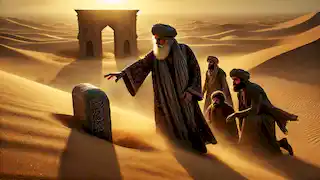
The Diplomatic Dilemma
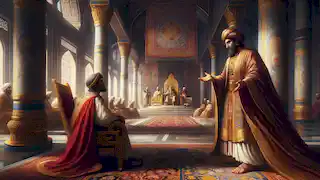
The Test of Loyalty
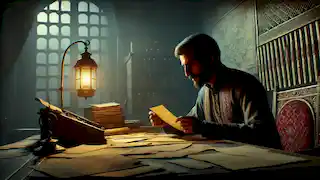
Epilogue: The Reward of Wisdom
